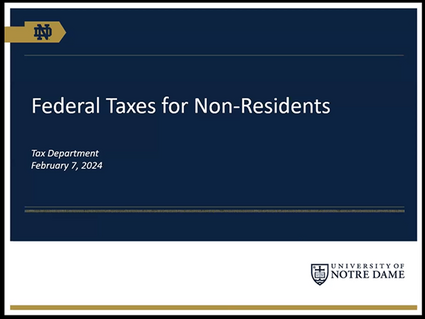The Internal Revenue Service, usually referred to as the IRS, is the name of the U.S. tax collection agency. International students, scholars, employees and their dependents who are present in the United States (whether or not they received income) in a given year are required to file a tax return with the Internal Revenue Service (IRS) by April 15 of the following year.
|
|
Understanding U.S. Income Tax
Income taxes are typically calculated based on the income earned from January 1 to December 31 of any given year. An income tax return will be used to report income, expenses, and other tax-related information to calculate the amount owed or the amount to be refunded.
Establishing Residency for Tax Purposes
Tax residency status determines which forms to file. More information can be found here.
Most international students and scholars (F-1 or J-1 status) are considered non-residents for tax purposes. J-1 and F-1 students are usually considered residents for tax purposes after being present in the U.S. for five calendar years. Most employees (H-1B, E-3, TN, or O-1 status) are considered residents for tax purposes.
No Income/ Scholarship
Non-residents for tax purposes with F or J status who are present in the U.S. but do NOT have U.S. sourced income must file Form 8843. You can use the Sprintax system to prepare the Form 8843, or follow the instructions found here.
U.S. Source Income
If an individual was present in the U.S. in a given year and received U.S. sourced income, they will file an income tax return (1040-NR) in the following spring. Students: Scholarships that provide funding for anything more than tuition will be taxed as income; this includes room & board. Those students receiving these scholarships will be issued a Form 1042-S from the University.
Students, scholars, and employees are responsible for filing the appropriate forms with the Internal Revenue Service (IRS) and the state Department of Revenue.
Sprintax - for individuals filing as Non-residents
In order to assist members of our international community, the University of Notre Dame offers an access code for Sprintax, an online tax preparation system; this access code provides FREE federal tax preparation services and a $5.00 discount for state tax preparation each spring. The Sprintax code is sent out via email to all enrolled F and J students; contact us at issa@nd.edu if you did not receive the code and would like to request one.
Although you must be filing as a Non-resident in order to use Sprintax, this resource is available to current Notre Dame students (including alum who are filing within one year of their graduation date), scholars, and employees.
Sprintax offers step by step instructions through their online portal and a 24/7 live chat help line. You’ll also find information below for Sprintax webinars on filing taxes in the U.S.
SPRINTAX WEBINARS
While ISSA cannot advise on taxes, Sprintax offers free webinars that may provide helpful information for you to understand your tax status and the filing process. You can access the webinar videos here.
Note: If you need assistance with filing taxes for previous years, or you are late filing in Spring 2024, you will need to contact a tax professional who has experience supporting non-residents/residents with an immigration status.
Filing State Taxes
While you can utilize Sprintax to file your state taxes, there will be a charge; the discount code that ISSA provides is for $5. If you want to use Sprintax to file your federal taxes but file your state taxes on your own, you can look to the Department of Revenue for your state of residency/ies. If you lived in Indiana in the previous tax year, you will find more information for state filing as an international student here.
Note: Students that lived in Indiana in the previous tax year can find information about filing state taxes from the Indiana Department of Revenue here.
Tax Treaties
Several countries have tax treaty agreements with the U.S. allowing certain types of income to be exempt from federal income taxes. A list of those countries and the treaty can be found here. Tax treaties do not apply to state taxes.
If a student, scholar, or employee believes they are eligible to take advantage of a tax treaty between the U.S. and their home country, they must visit the IRS website for instructions on how to utilize this benefit.
Scams
No U.S. government agency, including the Internal Revenue Service (IRS) will contact you by email, phone, or text. Students, scholars, and employees should disregard any unsolicited emails, phone calls, or texts, or contact ISSA to confirm no further action is needed. Should the IRS need information, they will contact taxpayers by mail.

